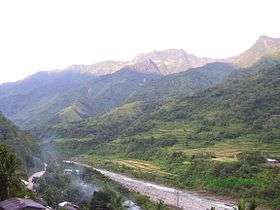Chico River (Philippines)
| Chico River | |
| Rio Chico de Cagayan | |
 The river along Bontoc | |
| Country | Philippines |
|---|---|
| Regions | Cordillera Administrative Region, Cagayan Valley |
| Tributaries | |
| - left | Mabaca River, Saltan River, Pasil River |
| - right | Bunog River, Tanudan River, Biga River |
| Source | |
| - location | Mount Data, Cordillera Mountains |
| - elevation | 2,079 m (6,821 ft) |
| - coordinates | PH 16°55′01.5″N 120°54′26.9″E / 16.917083°N 120.907472°E |
| Mouth | Cagayan River |
| - location | Santo Niño, Cagayan, Cagayan Valley |
| - elevation | 5 m (16 ft) |
| - coordinates | PH 17°57′50.5″N 121°36′36.2″E / 17.964028°N 121.610056°ECoordinates: PH 17°57′50.5″N 121°36′36.2″E / 17.964028°N 121.610056°E |
| Length | 174.67 km (109 mi) |
The Chico River (Spanish: Rio Chico de Cagayan) is a river system in the Philippines in the island of Luzon, encompassing the regions of Cordillera and Cagayan Valley.
The most extensive river in the Cordillera region, it covers the provinces of Mountain Province, Kalinga and Cagayan. It is one of the major tributaries of the Cagayan River.[1]
It is referred to as a "river of life" for the Kalinga people who live on its banks, and is well known among development workers because of the Chico River Dam Project, an electric power generation project which local residents resisted for three decades before it was finally shelved in the 1980s - a landmark case study concerning ancestral domain issues in the Philippines.[2][3]
Geography
The Chico has a length of 174.67 kilometers[4] and is a tributary of the Cagayan River.
Source and course

The highest headwaters begin along the slopes of Mount Data in the Cordillera mountains at Bauko, Mountain Province. It then flows northeastward through Bontoc, Sabangan, Sadanga, Tinglayan, Lubuagan, Tabuk City, Pinukpuk, Tuao, Piat, Rizal, and finally at Santo Niño, where it merges with the Cagayan River.
Its tributaries are the Bunog River to the south, The Tanudan and Biga Rivers to the east, The Mabaca and Saltan Rivers to the North, and the Pasil River further downstream.[1][5]
References
- 1 2 "Dams in the Cordillera" (PDF). International Rivers. Cordillera People's Aliiance - Public Information Commission. 1 January 2001. p. 1. Retrieved 11 January 2015.
- ↑ Bula-at, Leticia; See (editor/translator), Bernice (1996). "Indigenous Women's Struggles: The Chico Dam Project and the Kalinga Women". Solidarity Philippines Australia Network (SPAN). KASAMA Vol. 10 No. 2. Retrieved 11 January 2015.
- ↑ Malvar, Gabby. "Where the Chico River Rumbles". Travelife Magazine. Archived from the original on 7 April 2012. Retrieved 11 January 2015.
- ↑ Allad-iw, Arthur L. (6 June 2009). "Cordillera Tribes Heighten Struggle Against Large-Scale Mines in Chico River Watersheds". Northern Dispatch. Retrieved 11 January 2015.
- ↑ "Kalinga; The Land of Living Waters". Kalinga Provincial Government (official website). 27 December 2006. Archived from the original on 6 February 2007. Retrieved 11 January 2015.